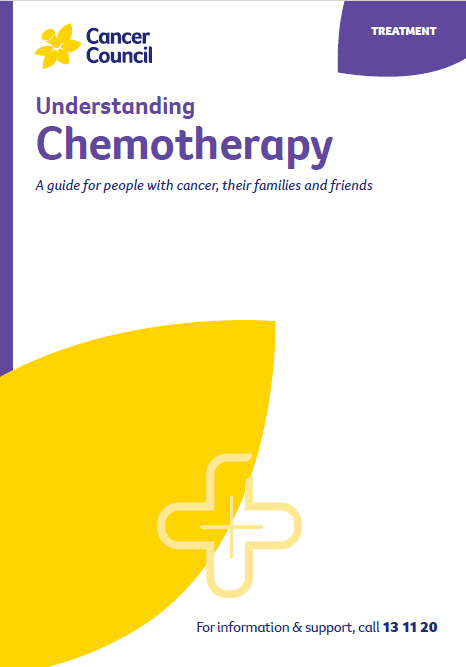- Home
- Pleural mesothelioma
- Treatment
- Chemotherapy
Chemotherapy for pleural mesothelioma
Chemotherapy uses drugs to kill or slow the growth of cancer cells while causing the least possible damage to healthy cells.
Learn more about:
Overview
The goal of chemotherapy is usually to shrink the cancer, reduce symptoms and improve quality of life. For some people with mesothelioma, chemotherapy doesn’t work.
The main chemotherapy drugs used for pleural mesothelioma are pemetrexed in combination with carboplatin or cisplatin. The targeted therapy drug bevacizumab may be added to this combination.
Research shows that using some drugs together can give improved results compared with using just a single drug. Vinorelbine (and less commonly gemcitabine) may be used if mesothelioma returns.
Having chemotherapy
| How chemotherapy is given | Chemotherapy is usually given through a drip into a vein (intravenously). The drugs travel through the bloodstream and reach the entire body. This is known as systemic chemotherapy. |
| Chemotherapy sessions and treatment cycles | You will usually have chemotherapy during day visits to your hospital or treatment centre. Each session may last for several hours and be followed by a rest period of several weeks. Together, the session and rest period are called a cycle. You will probably have up to 6 cycles. However, the length and timing of the treatments and rest days of each cycle may vary from person to person. |
| Effects on the immune system | Chemotherapy weakens the immune system by lowering the level of white blood cells, making it harder for your body to fight infections. If you have a temperature over 38°C, contact your doctor immediately or go to your nearest hospital emergency department. |
Side effects of chemotherapy
Most chemotherapy drugs cause side effects, which depend on the type and dose of the drug. You may have vitamin B12 injections and low-dose folic acid, which have been shown to reduce the side effects of pemetrexed and cisplatin.
Common side effects of chemotherapy include:
- tiredness and feeling weak (fatigue)
- nausea and/or vomiting
- bowel problems (anti-nausea drugs can also cause these)
- sore or dry mouth, or small ulcers in the mouth
- taste changes and/or loss of appetite
- increased risk of anaemia (low level of red blood cells)
- reduced kidney function
- skin rash
- numb or tingling hands or feet (peripheral neuropathy)
- ringing in the ears (tinnitus) or hearing loss
- red and itchy eyes (conjunctivitis).
You will have medicines (such as anti-nausea drugs) to help control any side effects. If side effects become too difficult to manage, your oncologist can adjust the dose or type of chemotherapy.
While hair loss and scalp problems are rare with chemotherapy for mesothelioma, some hair thinning may occur. Some people have trouble thinking clearly or experience short-term memory loss after chemotherapy, but this usually improves once treatment ends.
If you have the targeted therapy drug bevacizumab, side effects differ to chemotherapy, and may include hypertension, bleeding and blood clots.
For more on this, see Chemotherapy, Changes in thinking and memory, Peripheral neuropathy and our brain fog podcast.
→ READ MORE: Radiation therapy for pleural mesothelioma
Podcast: Making Treatment Decisions
Listen to more episodes from our podcast for people affected by cancer
Video: What is chemotherapy?
Watch this short video to learn more about chemotherapy.
All updated content has been clinically reviewed by A/Prof Anthony Linton, Medical Oncologist, Concord Cancer Centre and Concord Repatriation General Hospital, NSW; Dr Naveed Alam, Thoracic Surgeon, St Vincent’s Private Hospital Melbourne and Monash Medical Centre, VIC; Prof David Morris, Peritonectomy Surgeon, St George Hospital and UNSW, NSW. This edition is based on the previous edition, which was reviewed by the following panel: A/Prof Anthony Linton (see above); Dr Naveed Alam, (see above); Donatella Arnoldo, Consumer; Polly Baldwin, 13 11 20 Consultant, Cancer Council SA; Dr Melvin (Wee Loong) Chin, Medical Oncologist, Sir Charles Gairdner Hospital and National Centre for Asbestos Related Diseases, WA; Prof Kwun Fong, Thoracic and Sleep Physician and Director, UQ Thoracic Research Centre, The Prince Charles Hospital, and Professor of Medicine, The University of Queensland, QLD; Vicki Hamilton OAM, Consumer and CEO, Asbestos Council of Victoria/ GARDS Inc., VIC; Dr Susan Harden, Radiation Oncologist, Peter MacCallum Cancer Centre, VIC; Penny Jacomos, Social Worker, Asbestos Diseases Society of South Australia, SA; Prof Brian Le, Director, Parkville Integrated Palliative Care Service, The Royal Melbourne Hospital and Peter MacCallum Cancer Centre, VIC; Lung Cancer Support Nurses, Lung Foundation Australia; Jocelyn McLean, Mesothelioma Support Coordinator, Asbestos Diseases Research Institute, NSW; Prof David Morris (see above); Joanne Oates, Registered Occupational Therapist, Expert Witness in Dust Diseases, and Director, Evaluate, NSW; Chris Sheppard and Adam Barlow, RMB Lawyers.
View the Cancer Council NSW editorial policy.
View all publications or call 13 11 20 for free printed copies.
